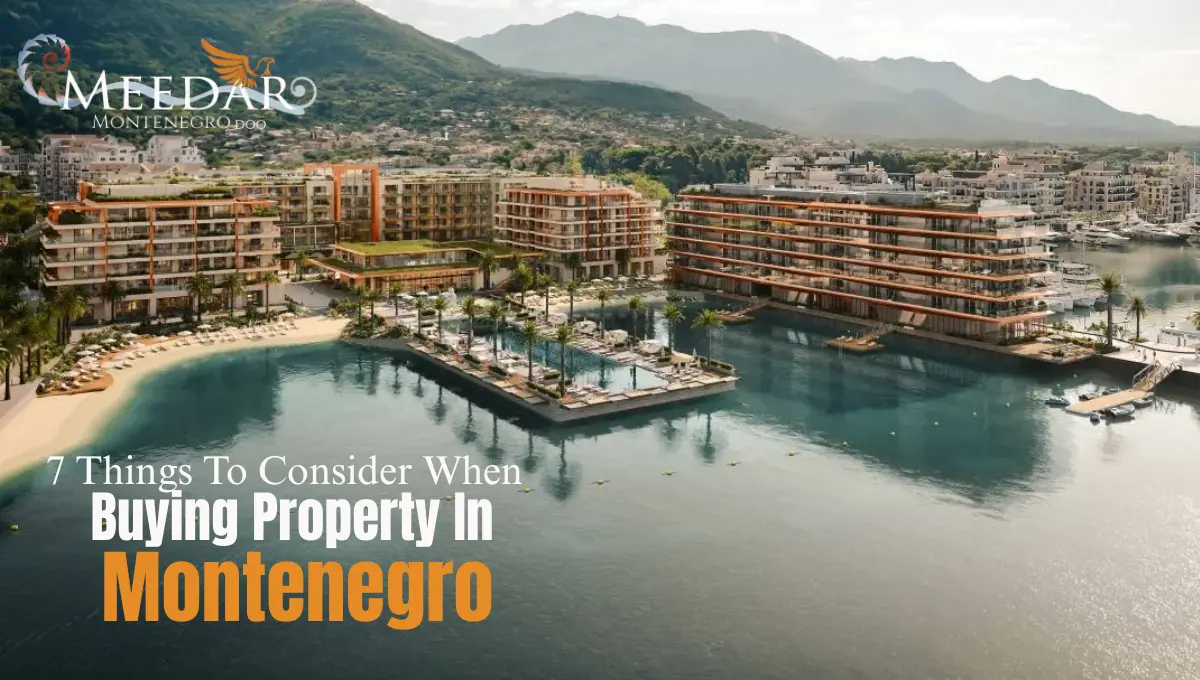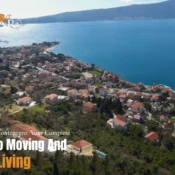
7 Things to Consider When Buying Property in Montenegro
Montenegro has emerged as one of the most attractive real estate markets in Europe. Its stunning coastline, picturesque mountains, and favorable tax environment attract both locals and international buyers. However, buying property in Montenegro requires careful planning, informed decisions, and a clear understanding of the market. Many people rush into purchases without considering essential factors, which can lead to costly mistakes. This guide highlights seven critical considerations to help you make a smart investment in Montenegrin real estate.
1. Understand the Local Real Estate Market
Before buying an apartment in Montenegro, you should analyze the local real estate market. Prices vary significantly between coastal regions like Budva, Kotor, and Tivat, and inland areas like Nikšić and Pljevlja. Coastal properties tend to have higher demand due to tourism, offering strong rental potential, while inland properties provide affordable options and quieter lifestyles. Study recent property transactions, consult local agents, and observe trends in property appreciation. Understanding market dynamics helps you make an informed decision and avoid overpaying.
2. Verify Legal Ownership
Always verify property ownership before signing any agreement. Montenegro maintains a well-structured land registry, but buyers must conduct thorough due diligence. Check the property title, confirm the seller’s identity, and ensure no legal disputes or unpaid taxes exist on the property. Hiring a local lawyer who specializes in real estate can help you navigate legal requirements and avoid potential pitfalls. Verifying ownership guarantees that your investment remains secure and protected.
3. Consider Property Location
Location plays a crucial role when buying property in Montenegro. Coastal towns offer stunning sea views, access to beaches, and strong tourism-driven rental opportunities. Mountain regions provide tranquility, scenic landscapes, and potential for long-term value growth. Additionally, consider proximity to essential amenities such as schools, hospitals, shops, and transportation hubs. The right location can enhance your lifestyle, increase rental income, and improve the property’s resale value.
4. Understand Property Taxes and Fees
Montenegro has favorable tax policies for real estate buyers, but you should understand all associated costs. When purchasing villas for sale in Montenegro, you must account for a transfer tax, notary fees, registration fees, and potential legal fees. Buyers also pay annual property taxes, which vary depending on property size and location. Consulting with a local tax advisor or real estate professional ensures you calculate the total cost of ownership accurately. Awareness of taxes and fees prevents unpleasant surprises and helps you budget effectively.
5. Inspect the Property Thoroughly
Never skip a physical inspection of the property. A thorough inspection helps identify structural issues, water or electrical problems, and potential maintenance costs. If you plan to renovate or upgrade the property, assess the feasibility and cost before purchase. Engaging a professional inspector can provide detailed reports and give you confidence in your investment. Property inspections protect you from hidden defects and unexpected expenses, ensuring a smooth buying process.
6. Explore Financing Options
Many buyers assume they must pay in cash, but Montenegro offers financing options through local banks and international lenders. Mortgage availability varies, and terms depend on residency status, property value, and buyer profile. Explore interest rates, repayment schedules, and eligibility requirements before committing. Understanding financing options allows you to leverage your investment strategically and make the purchase more affordable.
7. Plan for Long-Term Investment
When buying property in Montenegro, consider your long-term goals. Are you buying a vacation home, a rental property, or a permanent residence? Each purpose requires a different strategy. Coastal properties generate high seasonal rental income, while inland properties may offer better long-term appreciation. Think about maintenance, property management, and potential resale value. Planning for the long term ensures your investment remains profitable and meets your lifestyle needs.
Bonus Tip: Work with Local Professionals
Engaging local real estate agents, lawyers, and notaries can streamline the buying process. Professionals understand Montenegrin regulations, property markets, and paperwork requirements. They can negotiate better deals, uncover hidden opportunities, and ensure compliance with legal formalities. Working with experts minimizes risks and saves time, helping you enjoy a hassle-free property purchase experience.
How Meedar Montenegro Supports Your Property Investment
When you choose Meedar Montenegro, you gain a reliable partner who guides you through every step of buying property in the country. From identifying the best locations and negotiating fair prices to handling legal paperwork and ensuring compliance with Montenegrin property laws, Meedar Montenegro simplifies the entire process. In the future, they can help you manage your property efficiently, provide insights on rental opportunities, and advise on potential resale strategies to maximize your investment. Their local expertise ensures that your property purchase remains secure, profitable, and hassle-free, giving you peace of mind and confidence in your investment.
FAQs
1. Can foreigners buy property in Montenegro?
Yes, foreigners can buy property in Montenegro. EU citizens enjoy the same rights as locals, while non-EU buyers may need government approval for certain property types.
2. How much does it cost to buy property in Montenegro?
Property prices vary by location. Coastal towns like Budva and Kotor are more expensive, while inland areas like Nikšić are more affordable. Costs also depend on property size, type, and amenities.
3. Do I need a lawyer to buy property in Montenegro?
Hiring a local lawyer is highly recommended. They help verify legal ownership, handle contracts, and ensure compliance with Montenegrin property laws.
4. What additional fees should I expect when buying property?
Buyers pay transfer taxes, notary fees, registration fees, and annual property taxes. Understanding these fees upfront prevents unexpected expenses.
5. Can I rent out my property in Montenegro?
Yes. Many buyers purchase property for rental income. Coastal areas attract tourists during the summer, providing high rental potential, while inland areas may offer steady long-term rentals.
Conclusion
Buying property in Montenegro offers incredible opportunities for both lifestyle enhancement and financial growth. By understanding the local market, verifying legal ownership, choosing the right location, budgeting for taxes and fees, inspecting properties, exploring financing, and planning for the long term, you can make a confident and informed investment. Engaging local professionals adds an extra layer of security and efficiency, ensuring your purchase goes smoothly.
Montenegro’s real estate market continues to grow, attracting buyers from across Europe and beyond. By considering these seven factors, you position yourself for success, whether you seek a vacation retreat, rental income, or a permanent residence. Approach the process with care, diligence, and local expertise, and your Montenegrin property investment can become a rewarding asset for years to come.



